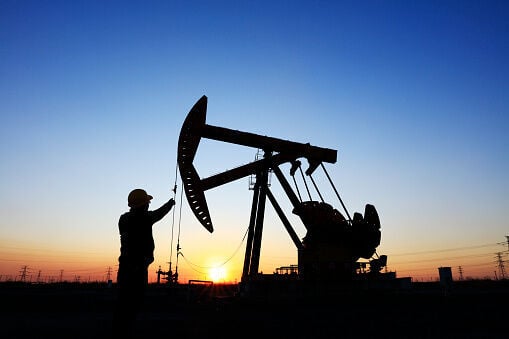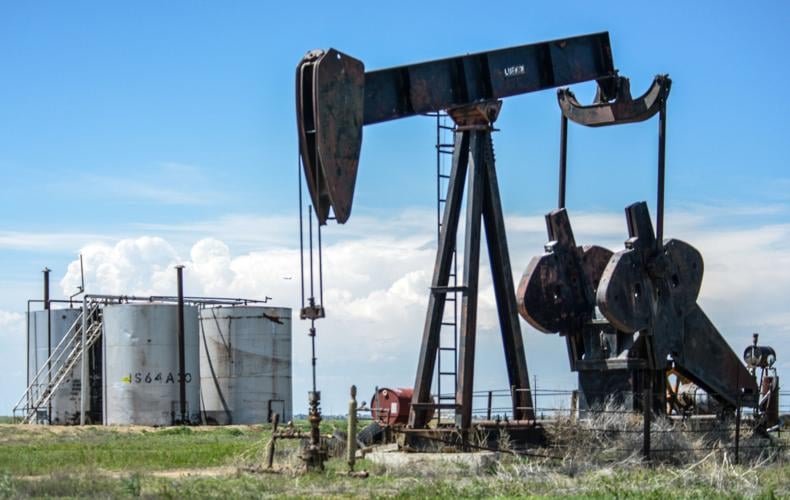A panel of Colorado lawmakers on Thursday night rejected legislation that sought to ban all new oil and gas drilling in Colorado by 2030.
Senate Bill 24-159 would have mandated the Colorado Energy & Carbon Management Commission to adopt rules on ceasing the issuance of new oil and gas permits before Jan. 1, 2030.
Sponsors of the bill claimed the move to end new oil and gas drilling is necessary to counteract climate change and address "adverse health impacts," while representatives of the oil and gas industry decried the measure.
The Senate Agriculture & Natural Resources Committee rejected the measure by a 5-2 vote just before midnight.
Oil and gas industry representatives lauded the bill's demise.
Dan Haley, president and CEO of the Colorado Oil & Gas Association, called lawmakers' decision a "win for our state, for the environment and for common sense."
"Senate Bill 159, written and promoted by extreme environmental activists, never should have been introduced," Haley said in a statement. "It sent a chilling message to every business across the state that some state legislators would consider putting you out of business, even if you supply a product they use every single day."
He added: "The bill would have ended the livelihoods of tens of thousands of Coloradans, threatened hundreds of millions of dollars for local roads and schools, and would have driven up our energy bills."
The Colorado Chamber of Commerce echoed the sentiment.
“SB 159 was one of the most hostile bills targeting the energy industry we’ve ever seen, and its impact would have resonated far beyond oil and gas," Loren Furman, the chamber's president and CEO, said in a news release. "The disturbing volume of bills coming from the Capitol that create an unwelcoming environment for business sends the wrong message across the state."
She added: "This is about preserving jobs, and members who voted ‘no’ tonight acted in support of the hundreds of thousands of Coloradans directly or indirectly employed by the energy industry. We applaud their courage and support of the statewide business community.”
Oil and gas production in Colorado is among the state's top industries. A study from the American Petroleum Institute said that, in 2021, oil and gas activities contributed more than $48 billion to Colorado's gross domestic product — $19.8 billion in direct benefits and $20.8 billion in indirect benefits, which constituted 11.2% of the state’s total GDP.
A Common Sense Institute report earlier this month said if the bill became law, more than 181,800 jobs would be lost, 70% of them within metro Denver alone. Meanwhile, $2 billion in state and local tax revenue would be at risk, and school funding would decrease by over $400 million over a decade.
Another study showed a smaller footprint and economic impact. In a January 2023 report, the Colorado Fiscal Institute counted 20,475 oil and gas jobs in Colorado as of March 2022. That number made up just 0.7% of total jobs in the state, the group said.
The Colorado Fiscal Institute study said while some communities would have a harder time than others transitioning from "pollution-causing fuels to clean energy, this analysis shows it is entirely feasible for Colorado to diversify its economy, (and) move away from oil and gas development.”
The bill — sponsored by Sen. Sonya Jaquez Lewis, D-Boulder, Sen. Kevin Priola, D-Henderson, Rep. Andrew Boesenecker, D-Ft. Collins, and Rep. Julia Marvin, D-Thornton — claimed that Colorado's economy is “ready for the clean energy transition” and that the industry produces “roughly four times more natural gas, and two times more oil than Coloradans use.”
In introducing the bill, Jaquez Lewis said it is a coalition-driven policy that demonstrates a commitment to the state's climate goals and the need for policy change to realistically address climate change.
“The oil and gas industry is important to Colorado,” she said, but to meet clean energy goals, “we cannot keep drilling forever. This industry is the No. 1 source of our severe air quality problem, and it is negatively impacting public health.”
Priola, meanwhile, cited other states that have taken similar actions. The evidence is clear, he said, that the state needs to move toward more "clean" and "renewable" energy and start to transition away from fossil fuels. The bill would do that, he told the committee.
Priola, who two years ago changed party affiliation from Republican to Democrat, appears to be a recent convert on the subject of oil and gas.
His campaign website at the beginning of the year showed he backed oil and gas activity. Priola said he “supports a balanced energy plan ... (and) believes we should expand domestic oil and natural gas exploration along with technologies such as wind and solar.”
But his website, as of this week, sings a very different tune. The exact same section — on energy — now says he “supports renewable energy ... end our dependence on fossil fuel ... (and) believes we should expand research and development of new technologies such as nuclear fusion and battery storage.”
SB 159 was doomed from the start.
There was never a question about Gov. Jared Polis’ support for the bill — it wasn’t there.
Instead of being assigned to either the Senate’s health and human services or even energy committees, SB 159 was sent to the Senate Agriculture and Natural Resources Committee.
That virtually signaled its death knell before the first hearing.
Two of the committee’s four Democrats voted against it: the chair, Sen. Dylan Roberts of Summit County, and Sen. Janice Marchman of Berthoud, who had particularly strong words for the bill’s sponsors, the way the measure was crafted and the way the sponsors handled it.
In announcing her “no” vote, Marchman said that the bill offered no way to backfill schools yet put forth a plan to take away revenue, and that would leave the state facing the prospect of another debt to K-12 that the Colorado General Assembly will finally pay off with the 2024-25 budget and after 14 years.
Oil and gas companies pay what’s known as ad valorem taxes, as well as a type of property tax, both which go to local governments, including schools.
“I’m no shill for oil and gas,” Marchman said, adding she recognizes the scarcity in funding for public schools and the large role that the oil and gas industry plays in that funding.
The bill is short sighted and irresponsible to threaten the end of oil and gas, she said. She also criticized the stake-holding done by the sponsors, which she said was not conducted with the best results intended.
“We cannot legislate in silos” and make offers to work with the opponents after the bill comes out, she said.
Marchman added she tried to work with the sponsors in the weeks leading up to the bill hearing to no avail.
Then there was the fiscal note, and Jaquez Lewis noted she’d never seen one like it before.
Fiscal analysis usually shows the costs to the state for the current year, the next year and maybe one more outyear.
But the analysis for SB 159 was unlike any other — it showed the impact of the bill 10 years out, estimating a drop in revenue of $305 million in 2034-35, coupled with state expenses of $476 million for a total state impact of nearly $800 million, and more in the years after that.
The bill drew supporters from environmental groups, such as 350 Colorado, Good Business Colorado, Blue Rising, Wild Earth Guardians, Physicians for Social Responsibility and the Colorado Coalition for a Livable Climate.
Mark Belkin of Lakewood, a union organizer, including with United Mine Workers, spoke on behalf of Third Act Union, a senior volunteer group that works on climate change issues.
“Climate change is really a job killer and a threat to workers’ health and safety. Climate is as much an economic issue as it is a moral one,” he said.
Unchecked global warming undermines the state’s economy and family budgets, leading to higher health insurance premiums, he claimed.
The industry spins jobs versus the environment, which he called a false choice.
“Who are we going to believe today, science or an industry that continues to harm our children and planet?” Belkin said.
In an earlier interview with The Denver Gazette, Jaquez Lewis said that, while oil and gas production is important to Colorado, it's a "finite resource" and that "we can't keep drilling forever." She also said that people and families living near oil and gas wells are developing adverse health conditions, such as asthma, "at an alarming rate," and that the bill is "a land, air, water, and public health legislation."
"The reason why we are wanting to phase down is because Colorado needs to be a participant in what many other countries have pledged to do, which is to do something to reduce greenhouse gas emissions," she said. "And we know that oil and gas industry is one of the largest polluters when it comes to greenhouse gas emissions. So, we have to take steps to fall in line with what other countries and other states are doing."
In addition to the oil and gas drilling ban, the measure would have imposed expanded liability for decommissioning and remediating wells, saying it is "just and equitable for the owners and operators that have profited from oil and gas activity to pay for the remediation costs.” It went on to say that “it is a matter of great importance to public health and safety” that the costs “be paid to the fullest extent by all potentially responsible parties.”
In addition, the bill would have made prior owners and operators liable for cleanup costs of wells, regardless of how long ago they owned the facility and whether the prior operator violated any law.
Colorado Politics reporter Marianne Goodland contributed to this report.











(0) comments
Welcome to the discussion.
Log In
Keep it Clean. Please avoid obscene, vulgar, lewd, racist or sexually-oriented language.
PLEASE TURN OFF YOUR CAPS LOCK.
Don't Threaten. Threats of harming another person will not be tolerated.
Be Truthful. Don't knowingly lie about anyone or anything.
Be Nice. No racism, sexism or any sort of -ism that is degrading to another person.
Be Proactive. Use the 'Report' link on each comment to let us know of abusive posts.
Share with Us. We'd love to hear eyewitness accounts, the history behind an article.